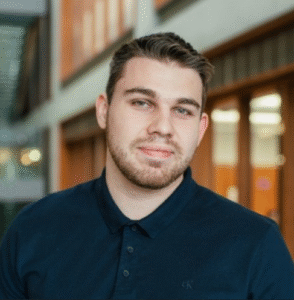Interview with Raza Hasanović

Raza Hasanović is a pediatric physical therapist and writer known for her blog on Substack, Written By Raza. She majored in biology and minored in public health as an undergraduate student at Drew University. She earned her Doctor in Physical Therapy degree from Kean University. Hasanović was the recipient of a BAPA Scholarship in 2019.
Can you describe your occupation, including your title, industry, duties, and the impact that your actions have in your field?
I’m a school-based pediatric physical therapist. I work with children who have special needs to help them physically access their school environment, whether that means learning to walk through hallways, climb the stairs, or participate alongside peers in gym class. By supporting my students’ gross motor development, I have the privilege of improving their confidence and independence within a school setting. My favorite part is helping them feel included and proud of what their bodies can do as well as learning to modify in cases where physical limitations exist.
Outside of my full-time career, I also write on my personal blog, Written by Raza. I consider it a public journal to share creative short stories about my family’s experiences during the Bosnian War and what it was like for me growing up in the US. My blog touches on themes like identity and belonging. Many of my readers are part of the Bosnian diaspora and have shared with me their own stories. Even though the war ended thirty years ago, our experiences continue to shape who we are and how we respond to the world. I believe that we feel seen when we are able to connect with someone else’s story. The details may differ, but the impact is the same. Written by Raza has helped me connect to myself, my multifaceted culture, and my community. It gives me purpose outside of my career
How did you get your start in your industry?
I earned my undergraduate degree in biology and minored in public health. I then went on to earn my doctorate in physical therapy, which took three years of schooling. My final year of grad school consisted of hands-on clinical work, during which I rotated through different settings, including outpatient orthopedics, inpatient rehabilitation, and school-based physical therapy. That final clinical setting was where I realized how much I enjoyed working with kids. It felt like the work had a real, tangible impact.
At the same time, writing was quietly present in my life. I took writing classes during college and always kept a blog in some form. Transitioning from my role as a college student to a full-time physical therapist left me feeling like there was something missing. That feeling led me to create Written by Raza. I remember a quote on the wall of my university’s science wing that has stuck with me. It said something like, “If you study the sciences, you must also study poetry and the arts.” The idea was that these unlikely pairings make you more well-rounded, and in my experience, certainly more fulfilled. I have really taken that to heart.
What steps have you taken over the years to advance in your industry?
To advance in my career as a physical therapist, I have consistently expanded my knowledge and stayed up-to-date with evidence-based practice. Maintaining my state license requires ongoing education, so I regularly take courses focused on pediatrics and other areas of interest, including orthopedics and pelvic floor health. Some of my students have been diagnosed with rare genetic disorders, so I study ongoing research that helps me understand what occurs in their bodies and how it may limit their physical function. As important as evidence-based practice is, experience is equally as important; motivating different personalities and maintaining creativity within my treatment plans is an integral part of my job.
During graduate school, I completed a yoga teacher certification, which has had a big impact on how I approach movement and breathwork with my students, especially those with sensory needs. It has given me a more holistic perspective and added another layer to the care I provide.
When it comes to writing, I believe that the best way to grow as a writer is to read a lot and write consistently. Being a writer doesn’t have to mean being published or widely known, although I would definitely love to get to that point one day. It means showing up for the craft, day after day, and learning how to better express your thoughts, emotions, and stories so that those reading your work can be moved.
How do you maintain your connection to the Bosnian community?
I was a BAPA Scholarship recipient during my first year of graduate school. Along with the generous financial aid that BAPA provided, the organization flew me out to Chicago to present on a topic of my choice. Engaging with the Bosnian diaspora from various parts of America and meeting young professionals doing important work in their respective careers was inspiring to me for my own journey.
Additionally, my blog serves as a space where I can tell Bosnian stories, because I truly believe that one person’s story can reflect the larger experience of an entire community. Writing became a way to reconnect to my culture and community.
I have dreams of one day publishing a collection of my work and reaching an even wider audience across the diaspora. Right now, I have built a meaningful foundation with Written by Raza; people from the diaspora reach out to share their own stories or to say that they feel represented when reading my work. That sense of shared experience is powerful and keeps me writing.
What aspects of the writing world have you made more accessible to the Bosnian community?
There have been so many incredible Balkan authors who have written about the kinds of experiences I also explore: war, identity, immigration, and belonging. What I hope to bring to the Bosnian community is my own honest voice and lived experience, shared in a way that feels personal and accessible. I believe that when you write from a place of truth and vulnerability, people can more easily connect to your story and see themselves as a character within it. You become a sort of friend through the magical experience of words and stories.
These days, social media is the go-to platform for many creatives, but I have found that long-form blogging is what works best for me. Maintaining a blog requires more of a gradual build-up in terms of readers and engagement, but it feels more authentic and sustainable than publishing short-form content on platforms like Instagram. My blog gives me space to dive deep into stories, and I think that resonates with people who value storytelling and who care about preserving Bosnian culture and memory. I like to think that Written by Raza fosters a more meaningful connection with its readers through its long-form content. It allows people to really get to know someone from within their own community, beyond a quick scroll by a short caption. And I think that kind of slow, intentional sharing is one of the most valuable ways to make Bosnian culture more accessible to Bosnians and non-Bosnians.
What has been a memorable project for you, and what did it teach you?
The Bosnia Diaries has been my favorite project by far. It’s a section of Written by Raza where I share my family’s stories in a memoir-style format. These diary entries are based on true recollections, save for a few clearly marked works of creative fiction. I think The Bosnia Diaries is the part of my blog that resonates the most with readers, which makes sense; it’s a kind of storytelling that I feel is deeply missing from our community. Every Bosnian family carries incredible stories of resilience, loss, survival, and identity, yet so few of them are captured in memoir form. With this project, I hope to contribute to our collective history.
My hope is that The Bosnia Diaries eventually becomes the foundation for a full-length book. More than anything, I want it to serve as a space where our memories live on—not just in our homes and during conversations, which are equally healing and therapeutic, but in writing that can be shared, revisited, and passed down across generations. After all, our new roots are reaching deeper into American soil as the years pass, and having a source of reflection on profound experiences like war and immigration is the ultimate gift we can leave for our children and grandchildren.
What advice do you have for Bosnian-American professionals who want to join your industry and succeed like you?
For those interested in the field of physical therapy, my biggest piece of advice is to immerse yourself in your education and make sure you are genuinely curious about the human body and how it works. A deep interest in anatomy and physiology is essential to finding joy and purpose in this field, but so are flexibility and creativity. Physical therapy is a steady, rewarding career. It’s one of the few jobs where you can feel your impact every single day. That said, it’s also a demanding job—physically, mentally, and emotionally—so it’s important to choose a speciality within the profession that allows for balance and recovery. Burnout is real, and the better you care for yourself, the better care you’ll be able to provide others.
When it comes to writing, my advice is simple: just start. Practice, explore your curiosities, pay attention to the world, and give yourself the space to grow. Not everything you create will meet your own standards, and that’s okay. What matters is consistency and integrity, showing up for your work, and building trust with your audience over time.
We live in a culture that often tells us hobbies only matter if they generate income, but I believe your creative work can have value simply because it heals you or because it helps someone else feel seen. If it opens doors to external success or financial support, that’s a beautiful thing, but it’s not a requirement.
In short: dream boldly, honor your curiosities, work with intention, and make room for both your professional and creative sides. There’s room for all of it.




